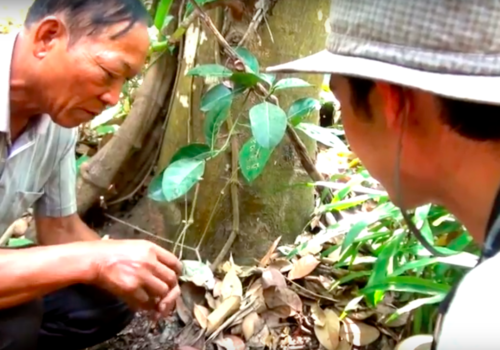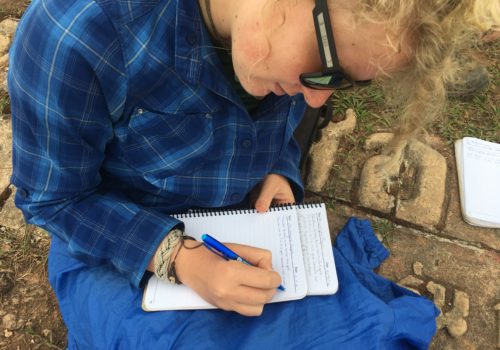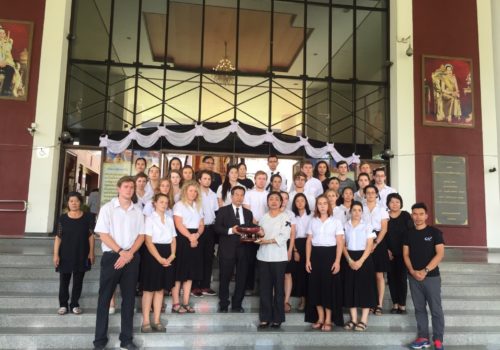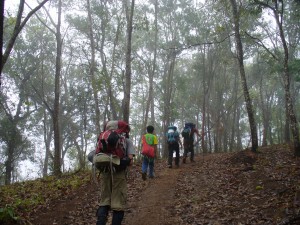
Hiking through the forest in the clouds.
Many of the marginalized communities in Thailand have lived for generations in what are now classified as “protected” areas. National parks, forest reserves and wildlife sanctuaries have been declared in recent years (often after a coup) to extend state control and, it often seems, to make it easier for the state to proceed with building dams, clear cutting forests for monocrop plantations, and other mega projects.
Villagers have been fighting this for decades, with limited success. Every time the state extends control or evicts villagers from their ancestral lands (often at gunpoint), it is with the claim that villagers are “degrading” the resources. Human occupation of course impacts the environment, but these communities have, by necessity, learned how to do it in a sustainable way. It is especially ironic that the excuse is “protection” when, in fact, the real goal — as we’ve seen year after year — is resource exploitation and privatization through dams, mining concessions and other mega projects controlled by the elite.
One of my favorite writers is Sanitsuda Ekachai, a reporter for the Bangkok Post. Her posts are always relevant, and she understands the social and political context better than just about any other writer in the Thai media. Below is a recent editorial that speaks to some of these issues that we study in our Forests and Rivers course, and touch on in the others as well, since many communities in Thailand are constantly under threat from resource exploitation and centralized control.
————————————–
Posted in the Bangkok Post on Friday, January 22, 2010
Forest eviction plan to steal from the poor
Posted by Sanitsuda Ekachai
Ulterior political motives aside, the Khao Yai Thiang controversy highlights how draconian central land control, legal impotency and endemic corruption are causing systematic land theft from the poor.
But it is a pipedream to hope that the government will use the controversy to clean up the system.
After all, General Surayud Chulanont is just one of the countless powerful figures and investors who have encroached on the commons to build resort businesses and holiday homes.
And who dares stir up the hornet’s nest?
Yet, without any sense of guilt, the forest authorities are using the Khao Yai Thiang controversy to step up their crackdown on the poor who live in the grey forest zones.
This is not a farce.
This is exactly what the Natural Resources and Environment Ministry has up its sleeve.
The ministry’s permanent secretary, Saksith Tridech, said recently there are over 450,000 people illegally occupying 5 million rai of forest land.
To counter them, the ministry will combine forces with the military and police to immediately crack down on the 190 critical areas across the country.
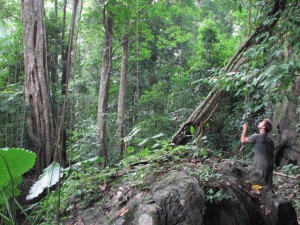
A forest area protected by the Karen.
The evictions will start without waiting for any pending court decisions because it would otherwise be too late to rehabilitate the degraded areas, Mr Saksith said.
Interestingly, among the ministry’s first urgent targets are the communities which have been fiercely fighting to reclaim land rights and to oppose the environmentally destructive state projects.
For example, the Kaeng Krung community which opposes the construction of Kaeng Krung dam in Surat Thani. And the Konsarn villagers in Chaiyaphum who are defiantly fighting against state-sponsored eucalyptus tree farms.
Obviously, the forest authorities see this is as a chance to get rid of the thorns in their side _ and to enjoy a huge budget at the same time.
How huge?
According to Mr Saksith, the first eight months of the nationwide eviction will need 1,200 to 1,500 million baht. And he needs a lot more to carry out the five-year crackdown plan.
Nationwide civil uprising is on the horizon if the cabinet approves this daylight robbery.
As taxpayers, why are we continuing to allow these bureaucrats and politicians to ruin our forests and steal from the poor?
One of the main reasons is because we have long been brainwashed into believing that the forests must be free from human habitation and conservation is best done through central control.
This belief is rooted in our ignorance about the way of life of the rural folk and lack of respect for their ability to manage their pool resources sustainably.
Following state central control in the past century, the rural communities have suffered from logging concessions and the draconian zoning of national forests which has turned local inhabitants into illegal encroachers.
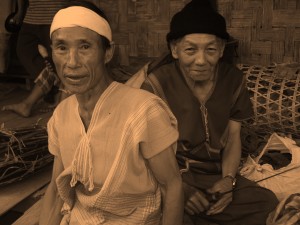
Karen village elders.
Big dams, mining, massive tree farms and cash crop plantations _ all state policies _ further destroy the wilderness and the locals’ sources of livelihood. Meanwhile, land speculation amid weak law enforcement and fierce corruption has put much scenic forest land in the hands of the rich.
The injustice has given rise to nationwide resistance on the ground through the community forest and land reform movements.
The Thai villagers are not alone. Across the globe, the plunder of natural resources from draconian state policies has given rise to similar grassroots movements to manage the commons themselves.
From her extensive research in various parts of the world, the users-managed properties often work better than state control, concludes Prof Elinor Ostrom of Indiana University, USA.
And the world is listening, having honoured her with this year’s Nobel Prize in Economics.
Thailand is abundant with success stories of users-managed forests, rivers, lands and coastal seas. Yet, we refuse to take note.
If we support their movements, we can help them save the commons from breaking down. Or we can just allow the authorities to exploit nature to serve the rich and big business.
The choice is ours.
